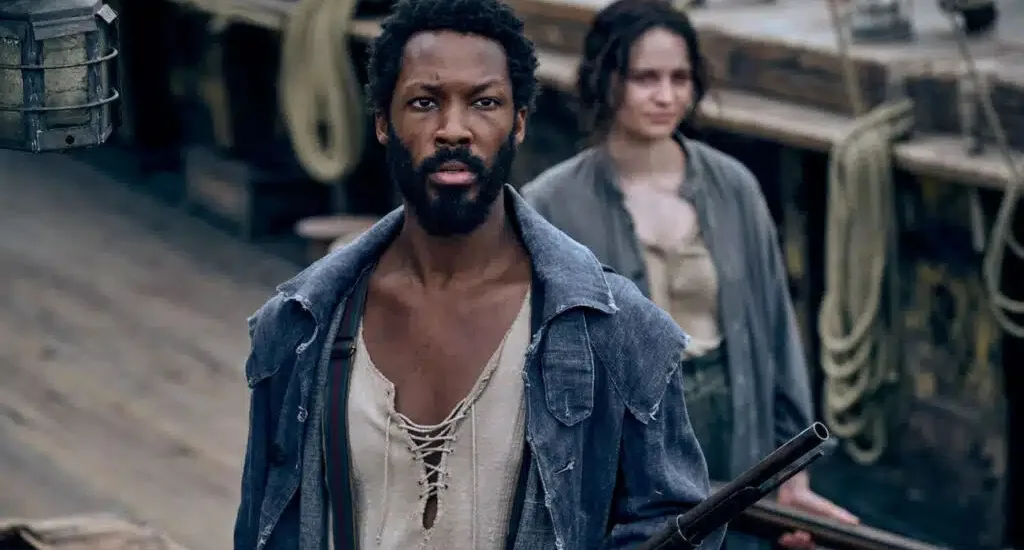The vampire myth has always had a strong appeal in Hollywood. Initially restricted to the world of terror, it gradually began to gain new nuances (not only in cinema, but also in literature), generating plots that could range from drama to intrigue, from action to romance, from comedy to existential questions, often portraying the legendary night leeches more like dark superheroes than the frightening monsters of yore. Stories about vampires are no longer exclusive to the horror genre, therefore. And the proposal to Dracula: The Last Voyage of Demeter, directed by Norwegian André Øvredal, seems to be exactly rescuing this old approach.
A mysterious ship is found stranded off the coast of England. Inside its devastated interior is found the captain's diary, which tells how the demeter has been hired to transport a mysterious cargo from Romania to London. Among its crew members is Clemens (Corey Hawkins), a black doctor who seeks to return to his native England. The trip begins normally, despite some demonstrations of superstition on the part of the local sailors, who refuse to take crates with the “mark of the dragon”. Everything changes when a sick-looking woman (Aisling Franciosi) is found in the holds of the ship. However, none of the crew members are prepared for the horror that is hidden inside the crates they are transporting across the sea.
Dracula: The Last Voyage of Demeter adapt the chapter The Captain's Log, from the book Dracula, by irish author Bram Stoker. 31 years separate us from the launch of the ambitious adaptation of Francis Ford Coppola from the same book. Movies (and books) about vampires existed before, but it was after Bram Stoker's Dracula that we saw the figure of the vampire diversify in cinemas. Interview with the Vampire (the movie, the book by Anne Rice is from 1976), night Angels, Twilight, Van Helsing, Dracula: The Untold Story, What We Do in the Shadows, Renfield, True Blood all emerged after the 1992 classic helped crystallize the image of the vampire as more than a blood-drinking monster in theaters. That's why it's interesting that the most recent direct adaptation of the original work returns to the horror of the older films.

So don't expect beautiful and seductive vampires here. Here we are talking about a classic horror movie, where a monstrous creature is a constant threat to a crew trapped in a supposedly inescapable environment (the ship Demeter). That is, the figure of the vampire in its most visceral form. It's easy to see more references to Nosferatu (1922) of FW Murnau than Coppola's Dracula.
With this climate that danger can be anywhere, it is even a surprise that management has not prioritized the infamous jump-scares (there are even some sudden appearances, but nothing as emphatic as the horror pattern of the 2000s), preferring to work in an atmosphere of growing tension plus a dose of wild violence, which creates an atmosphere of inescapable hopelessness. Dracula himself is rarely seen in his entirety, only in quick glimpses or shrouded in shadow. When he is finally seen, he is closer to a monstrous image than to the elegance of Gary Oldman. A very interesting approach to resume, even if its execution could be better.
See more: Review | Blue Beetle: Fun and Latinity in the Super-Heroes Genre
The film is not without some debatable points. The development of the main characters works well, but the secondary characters receive little attention. Of course, supporting actors are not expected to receive the same attention as the protagonists, but this greatly diminishes the impact of the massacre that takes place aboard the Demeter. Because we are talking about a small crew confined in a closed space, perhaps more moments of interaction between them (both friendly and hostile) would help to create a greater identification with the characters.
The script also has its slips when choosing certain easy solutions and miraculous coincidences (such as the fact that Anna, the woman from the Romanian countryside found on the ship, speak perfect English; and this is just one of several obscure points that would require further explanation). Perhaps a part of the public is not bothered by these “small” conveniences adopted in the script, but which can also require a considerable dose of goodwill so as not to disrupt the experience.
See more: Review | Talk to me
The cast does not disappoint. Corey Hawkins is convincing as the black doctor Clemens, and the same can be said for Aisling Franciosi as Anna. However, the biggest highlight is, by far, Liam Cunningham (O Ser Davos in game of Thrones) like the Captain Elliot. The rest of the cast, as mentioned before, has little opportunity to appear, but it is still possible to praise the young man. Woody Norman (Toby) and the Serbian actor Stefan Kapicic (Olgaren), which achieve some prominence with little screen time.
Dracula: Demeter's Last Voyage offers a throwback to pre-'90s vampire horror movies. This classic approach clearly still has a lot to offer the cinema, even if the film does have some inconsistencies. It deserves to be seen in theaters, if only to recall the old atmosphere where the vampire is a monstrous being to be feared.















































